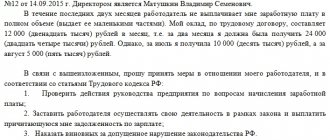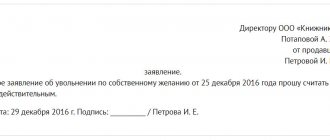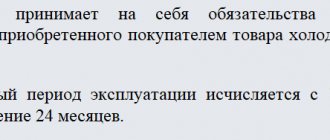Reasons for voluntary dismissal of an employee
The provisions of the law (Article 80 of the Labor Code of the Russian Federation) allow an employee to terminate an employment contract on his own initiative, having warned management in advance about his intentions and without explaining the reasons.
But in some cases, disclosing the reasons for dismissal can speed up the process. Thus, termination of the contract must be completed no later than the date specified in the application if the citizen retires or enters an educational institution.
Termination of the contract on any day appointed by the employee can also occur if management violates labor law standards. These include: delays in wages, violation of the terms of the contract, agreements, other internal acts, refusal to grant regular leave.
The reason for dismissal may also be the expiration of a fixed-term contract. If there is no desire on the part of the employer to terminate a fixed-term employment contract concluded for a period of up to 2 months, the employee should notify his superiors about his resignation, but no later than 3 days before the end of the contract.
Order of dismissal
Unlike an application for dismissal, the order has a unified standard form (T-8) and is issued in two copies. One is for the accounting department. The latter, in turn, calculates the payments due to the employee and makes a transfer to his account no later than the day of dismissal.
What details must a dismissal order contain?
- code of management activities according to the all-Russian classifier – 0301006 (OKUD);
- code of enterprises and organizations (OKPO) - individual for each employer;
- name of the employer (company);
- text about what the order was issued;
- date and signature.
At the bottom there is a column for review and signature of the employee in whose name it was issued.
Which article of the Labor Code of the Russian Federation regulates dismissal at will?
Regulates the procedure for dismissal at one’s own request, Art. 80 Labor Code of the Russian Federation. Its basis is clause 3, part 1, art. 77 of the Labor Code of the Russian Federation - this norm is reflected in the entry in the work book.
In Art. 80 shows possible options for terminating contractual obligations at the employee’s initiative. The main condition for dismissal can be considered filing an application. If it is impossible to submit an application in person, it is also possible to send it by mail - this is evidenced by the letter of Rostrud dated 09/05/2006 No. 1551-6.
ConsultantPlus experts provided step-by-step instructions for dismissing an employee at his own request. Get free access to K+ and go to the Ready Solution to find out all the details of this procedure.
Let's consider the procedure for voluntary dismissal under the labor code.
What does termination of an employment contract without working time mean?
According to the general rules established by labor legislation, an employee can resign at his own request after working for two weeks after submitting an application for termination of the employment contract. However, the law does not prohibit in certain cases the termination of employment relations on the day the employee submits the relevant application, that is, to carry out “dismissal in one day.”
The reasons for which dismissal is possible on the day of filing an application are listed in Part 3 of Article 80 of the Labor Code of the Russian Federation. In addition, the parties can independently agree that an order to terminate the employment relationship will be issued on the same day.
In addition, it is possible to terminate a working legal relationship in one day by mutual consent of the employee and the employer (Article 78 of the Labor Code of the Russian Federation).
Article 78 of the Labor Code of the Russian Federation allows the parties to negotiate all the conditions for terminating legal relations, including the date on which the person will be dismissed.
If the employee does not have good reasons to terminate the legal relationship on the day of making the corresponding request, and the employer does not cooperate, it will not be possible to quit in one day.
Procedure for dismissing an employee at his own request (procedure, timing)
When dismissing at your own request, Article TC No. 80 regulates a certain procedure for this process.
The employee confirms his desire to terminate the employment contract by submitting a corresponding application to his superiors. At the same time, the timing of dismissal at one’s own request may vary, depending on the terms of the contract. If a fixed-term employment contract lasting up to 2 months is concluded, the employee’s working period lasts no more than 3 days from the date of submission of written notice of termination of the contract. The same rules apply to the procedure for dismissing an employee on a probationary period.
In other cases, unless otherwise provided by law, the employer has the right to terminate the contract 2 weeks after receiving the application. The counting period for this period begins from the next day. The contract may be terminated earlier at the discretion of management.
Within 2 weeks after submitting the document, the employee has the right to withdraw the application and continue working. The exception is cases when another person has already been invited to fill the vacant position, whose employment cannot be refused, for example, by way of transfer from another employer, according to Art. 64 Labor Code of the Russian Federation.
It is possible to dismiss an employee on his own initiative even during the days he is absent from the workplace due to incapacity for work. However, if the employee is against it, then he should rewrite the application and change the expected date.
Termination of the contract is also allowed when the employee is on regular vacation. In this case, working out the required period of 2 weeks may not be necessary. The day of dismissal is taken to be the last day of vacation.
More detailed information about this can be found in the material “How to properly arrange leave followed by dismissal .
Upon dismissal, an employee must be given a work book and other documents upon request containing data on the amount of salary. The amounts due should be paid no later than the last day of work, and if this is not possible (for example, if the employee is absent from work) - at his request at any other time.
When can you not work?
The legislative norm of the Labor Code, which allows not to work off, is spelled out in the third part of the article, number 80.
If the application submitted by the employee at his own request indicates grounds for termination of employment that truly do not allow him to continue working, the employer is obliged to terminate the current employment contract. In this case, the date of termination is indicated by the employee himself in his application!
Such a valid reason is:
- reaching retirement age and the employee’s desire to retire;
- enrollment in an educational institution for any form of education;
- proven violations by the employer regarding local or regulatory acts, as well as provisions of labor legislation.
That is, the legislation in these cases does not imply that upon dismissal, carried out at the request of the employee, he is obliged to actually continue working for two weeks.
And the very term “dismissal with service” or “dismissal without service”, so often used by both enterprise management and employees, does not make sense and is even contrary to the law.
The articles of the Labor Code do not provide for any “workouts” . There is only a period allotted for warning the employer.
That is, termination of an employment contract “without completion” is essentially a lack of notification on the part of the employee, which violates the norms of labor legislation.
But even in this case there are exceptions.
For example, in the event of a gross violation committed by the management of an enterprise (especially one that infringes on the rights of employees), the employee has the right not to submit a written notice.
In this case, the final resolution of the dispute (if any) will be made in court. And most court decisions are made in favor of the employee.
Payments under the Labor Code upon dismissal at will
In case of voluntary dismissal, the Labor Code guarantees certain payments to employees:
- The employee has the right to expect repayment of the employer's wage arrears.
- In cases where the next vacation is not taken in full, management pays compensation for all unused vacation days. If the right to rest is exercised in advance, then from the salary of the dismissed person the organization has the right to withhold previously paid amounts for undue periods of leave. In this case, the total amount of deductions should not exceed 20% of payments (Article 138 of the Labor Code of the Russian Federation).
More information about deductions in such cases can be found in the article “Deduction for vacation used in advance upon dismissal .
- Sometimes an employee can also count on severance pay. But this condition must initially be spelled out in internal local documents - labor and collective agreements.
Registration procedure
Termination of employment at the initiative of an employee implies the following actions:

- Submitting a notification application to the employer. The document indicates the reason for leaving and the date of planned termination of work. If the reason is not specified, HR staff may request additional documents (for example, from the place of study, if the departure is related to this particular circumstance).
- Issuance of an order. The document is filled out according to form T-8. It indicates the registration number of the notification application and provides a reference to the Labor Code (Article 77).
- Familiarization of the employee with the finished order. The person being dismissed must sign the document.
- On the last day before the date of termination of labor activity specified in the order, the final payment is made and documents are issued (the work book is handed over against signature!).
- Payments include unpaid wages for the last month, compensation for unused vacation days, and bonus payments.
How to properly fire an employee at his own request is a question that concerns many employers. Does the employee want to terminate the employment contract? Find out how to do this by reading our article.
If you need to calculate vacation pay in 2020, then the visual examples given here will help you with this.
Results
In order to avoid further disputes between the employer and employees, it is necessary to follow the procedure for dismissal at will.
Ignoring by an employee of a mandatory period of work is often considered a violation of labor discipline, and then the contract can be terminated on completely different grounds. You can find more complete information on the topic in ConsultantPlus. Full and free access to the system for 2 days.
Lack of processing
The procedure for leaving work early is described in detail in Art. 81 Labor Code of the Russian Federation. In addition to the provisions of the law, the parties have the right to rely on internal provisions approved by the enterprise or clauses in the employment contract.
Article 81 describes the reasons for leaving work without working:
- admission to an educational institution as a full-time student, during which further work is impossible;
- dismissal of a pensioner who has reached a certain age, since the law has granted him the right to receive pension contributions (similar measures are provided for a military pensioner);
- violations of the internal regulations of the enterprise, the terms of the collective agreement, non-compliance with the terms of the employment contract or the Labor Code of the Russian Federation;
- forced departure due to subsequent work activities in another region;
- traveling with your spouse to the place of his further service or new job;
- in connection with moving outside the Russian Federation in connection with the spouse’s fulfillment of labor obligations in the territory of a foreign state;
- medical prohibition from performing work duties when a person’s physical condition does not allow him to continue working;
- the arising obligation to care for a relative who has lost the ability to work, caring for a person with a disability;
- need to care for a child under 14 years of age (this includes situations of urgent dismissal of a single mother or mother of many children)
- the employee has the right to use the pregnancy period as a reason for quick dismissal at her own request;
- leaving for military service in the RF Armed Forces;
- violations of the Labor Code of the Russian Federation and other labor relations standards by the employer;
- changing the conditions for the performance of labor duties, without proper notification and agreement with the employee.
Each of the above reasons gives the right to quick termination of the employment contract, but requires the submission of additional supporting documentation. The simplest thing would be to obtain consent from management and terminate the contract in one day by agreement. If dismissal requires more time, the parties agree to provide time off, several days of vacation at their own expense.
Dismissal procedure
Upon completion of work at his own request, the employee must submit an application to his immediate supervisor. The document must indicate that he is asking to be relieved of his position from a certain date; there is no need to describe the reason why the employee wants to leave - the wording “at his own request” will be sufficient.
Based on this application, an order is issued to the enterprise and after a certain time the employee stops working, a final settlement is made with him: they issue a work book and other documents at his request (for example, a certificate of average salary, information about the insurance period, etc. ), as well as all the cash he should receive.
Article 80 of the Labor Code of the Russian Federation
2. By virtue of Part 1 of Art. 80 of the Labor Code of the Russian Federation, the employee’s will to terminate the employment contract must be expressed in writing. All other forms of such expression of will have no legal significance. An employee's initiative aimed at unilateral termination of an employment contract is usually expressed in the form of a corresponding written statement.
Commentary on Article 80 of the Labor Code of the Russian Federation
The employer issues a corresponding order regarding the dismissal of an employee on the grounds provided for in Article 80 of the Labor Code of the Russian Federation. Based on the order to dismiss the employee, other necessary documents are drawn up.
6. If, upon expiration of the notice period for dismissal, the employment contract has not been terminated and the employee does not insist on dismissal, then the contract continues. Thus, the fact that the employee’s work period has expired excludes the possibility for the employer to terminate the employment contract on the grounds in question, if “the employee does not insist on dismissal.” The latter formulation is broad and vague. It should be assumed that this applies to the case when, after the expiration of the notice period for dismissal, the employee returned to work and was allowed to work (i.e., continued to perform duties under the employment contract). At the same time, part 6 of the commented article should also apply when the employee expressed a desire to continue working and was not allowed to work, but the employer delayed the issuance of a work book, other documents required by the employee related to the work, as well as settlement with him.
We recommend reading: What is the pension of a disabled person of the first group in Moscow after 80 years
It should be borne in mind that the employee’s demand in question has legal significance only at the time of expiration of the working period. If the employment contract was not terminated upon expiration of the working period, the employee continued to work, and subsequently demanded termination of the employment contract with him with reference to Part 6 of the commented Article 80 of the Labor Code of the Russian Federation, such a requirement cannot be considered legal: the employment contract must be terminated according to the rules established by the commented article, including working out the established notice period for dismissal.
Commentary to Art. 80 Labor Code of the Russian Federation
Before the expiration of the notice period for dismissal, the employee has the right to withdraw his application at any time. Dismissal in this case is not carried out unless another employee is invited in his place in writing, who, in accordance with this Code and other federal laws, cannot be denied an employment contract.
The agreement of the parties on early (before the expiration of the 2-week period) termination of the employment contract must be expressed in writing, for example, in the form of an employer’s resolution on the application of the employee who requested dismissal from a specific date. An oral agreement between the parties cannot be evidence of such an agreement.
Sample application
Legislative acts regulating legal relations in the labor sphere do not contain unified application forms for voluntary dismissal. The employee can fill out the document by hand, while adhering to the following nuances:
- in the upper right corner of the form the position and full name of the addressee, as well as the position and full name of the applicant, are indicated;
- Below, in the center of the sheet, the name of the document is written - “application”;
- further, the employee turns to the management of the organization with a request to dismiss him at his own request, making reference to the relevant article of the Labor Code of the Russian Federation, and indicating the reasons for terminating the Employment contract without working off;
- Below is the date the document was drawn up, as well as the signature of the applicant.
Attention
The statement in this case differs from the standard one only by reference to the grounds for dismissal without service.
Example:
“Based on clause 3, article 77 of the Labor Code of the Russian Federation, I ask you to dismiss me from my position at my own request in connection with my retirement on July 30, 2019.”
Nuances to consider
If the employee continues to work after two weeks, it is considered that the employment contract with him has not been terminated
If an employee has written an application and is now working two weeks before the intended date of dismissal, he can change his mind at any time and withdraw his document - this is his right stated in the Labor Code. But if another employee has already been invited to take his place, and there is written evidence of this, it will no longer be possible to withdraw the application.
If, after two weeks, an employee continues to come to the workplace and work as if nothing had happened, let us remind you that it is considered that no one has terminated the employment contract with him.
An employee can notify the employer of his desire to terminate his employment relationship even from vacation or from home if he is there due to temporary disability.
Some tricks - how to avoid detention
In exceptional cases, no work is required:
- Enrollment in higher education institutions upon provision of a training order.
- When going on annual paid leave, if it is 2 weeks, subject to prior submission of a letter of resignation 14 days in advance (Article 127 of the Labor Code of the Russian Federation).
- If the husband or wife is transferred to work abroad or to another region. It is necessary to confirm the circumstance with an order, then dismissal without service will be legal.
- If the employer violates labor laws: regular non-payment of wages, lack of annual paid leave. All these facts must be recorded by the conclusion of the labor inspectorate, a court order or a response to a complaint to the prosecutor’s office.
- The leave on sick leave coincided with the two-week work period before dismissal.
Article 80 of the Labor Code of the Russian Federation
An employee has the right to terminate an employment contract by notifying the employer in writing no later than two weeks in advance, unless a different period is established by this Code or other federal law. The specified period begins the next day after the employer receives the employee’s resignation letter.
Commentary on Article 80 of the Labor Code of the Russian Federation:
The answer to this question follows from the main purpose of the notice of dismissal, namely: to enable the employer to select a new employee to replace the person resigning on his own initiative. By notifying the employer of dismissal in advance in writing, the employee provides him with such an opportunity. It doesn’t matter whether he is at work, on vacation or sick. From the moment the resignation is submitted, the employer has the right to begin searching for a new employee. Therefore, all this time from the date of filing the application for resignation at one’s own request is counted towards the notice period for dismissal.
The employer has the right to terminate the employment contract with the employee upon expiration of the notice period for dismissal at his own request and in the event that the employee becomes ill during the notice period and continues to be ill at the end of the notice period, because time of illness does not suspend the period after which the employee is subject to dismissal. Dismissal of an employee at his own request in accordance with his application is also possible during a period of temporary incapacity, because the initiative to dismiss comes from the employee, not from the employer.
The answer to this question follows from the main purpose of the notice of dismissal, namely: to enable the employer to select a new employee to replace the person resigning on his own initiative. By notifying the employer of dismissal in advance in writing, the employee provides him with such an opportunity. It doesn’t matter whether he is at work, on vacation or sick. From the moment the resignation is submitted, the employer has the right to begin searching for a new employee. Therefore, all this time from the date of filing the application for resignation at one’s own request is counted towards the notice period for dismissal.
We recommend reading: Deductions under a Temporary Employment Contract
Commentary to Art. 80 Labor Code of the Russian Federation
The Resolution of the Plenum of the Armed Forces of the Russian Federation dated March 17, 2004 N 2 clarified that termination of an employment contract at the initiative of an employee is permissible in cases where filing a letter of resignation was his voluntary expression of will. If the plaintiff claims that the employer forced him to submit a resignation letter of his own free will, then these circumstances are subject to verification, and the responsibility to prove them rests with the employee (subparagraph “a”, paragraph 22). At the same time, any pressure from the employer, incl. and the threat to fire him on his own initiative in cases where the employer had any reasons for this. Otherwise, we cannot talk about termination of the employment contract at the initiative of the employee. The Laginsky District Court of Elista quite correctly came to this conclusion, satisfying the claim for reinstatement of the citizen. U., who submitted her resignation at her own request under pressure from her manager, who threatened to “ruin her work book” by dismissing her “under article” for losing a report and failing to submit it (see Review of the judicial practice of the Supreme Court of the Republic of Kalmykia on the consideration of civil cases in cassation and supervisory procedures in 2006).
Meanwhile, this conclusion of the court does not correspond to Articles 64 and 80 of the Labor Code of the Russian Federation, since on February 9, 2007, at the time of withdrawal of the application for dismissal, M. continued to work in the same place, the defendant had not yet become obligated to conclude an employment contract with her, in she could have been refused employment as a transfer.
Kh. filed a lawsuit against the district administration for reinstatement at work, recovery of wages for the period of forced absence and compensation for moral damage. She motivated her demands by the fact that she was fired in violation of the procedure established by Art. 80 of the Labor Code of the Russian Federation.
Commentary to Art. 80 Labor Code of the Russian Federation
5. If after the expiration of the notice period the employment contract was not terminated, i.e. the employer has not issued a corresponding order (instruction), and the employee does not insist on dismissal, the employment contract continues.
1. This article deals with the most common basis for termination of an employment contract - at the initiative of the employee. Such an initiative can be caused by any reasons - relocation, desire to move to another job, etc.










